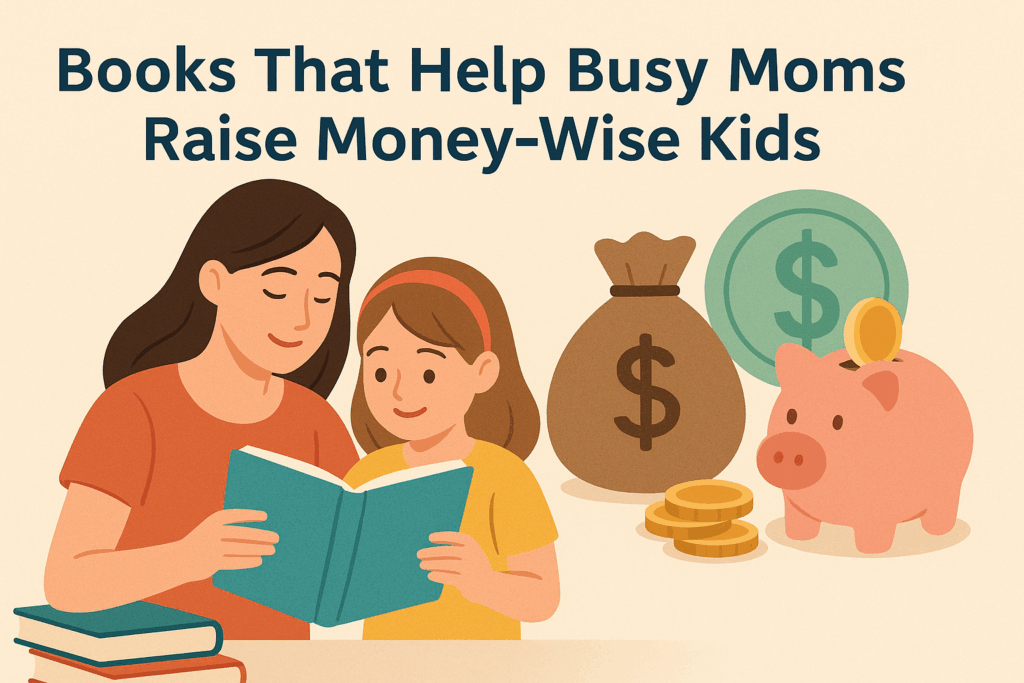If you grew up with money stress, you probably swore you’d do things differently with your kids. But now that you’re the parent, talking to your children about money may feel… complicated. Maybe you’re still healing from your own financial mistakes, or maybe no one ever taught you how money actually works.
So how are you supposed to teach your kids about it?
The good news: you don’t need to be a financial expert to raise money-smart kids.
You just need the right tools—and a willingness to talk openly, even if it’s messy.
This post is a curated guide for busy moms who want to:
- Teach their kids financial confidence
- Avoid passing on financial fear or silence
- Learn alongside their children, without shame
Below are the best books to help you raise children who understand, respect, and feel empowered by money—even if you’re still figuring it out yourself.
💸 Why Talking About Money Feels So Hard for Moms
Let’s be honest: most of us didn’t grow up with healthy money conversations. Instead, we learned that money was:
- A source of tension
- Something to be ashamed of
- A grown-up thing kids weren’t supposed to know about
Now we’re parents, and we feel torn. We want to give our kids better tools—but we’re afraid of saying the wrong thing, or revealing our own insecurities.
Here’s the truth: your willingness to talk is more important than your financial resume.
Let these books be your scripts, your guides, and your training wheels as you raise financially empowered kids—without perfection and without guilt.
📚 1. The Opposite of Spoiled by Ron Lieber
Why It’s Powerful:
Written by a New York Times personal finance columnist, this book is all about teaching kids values through money—not just dollars and cents. Lieber argues that honesty, gratitude, and patience are just as important as saving and spending wisely.
Key Takeaways:
- Allowance can be a teaching tool, not a reward.
- Talking about money builds character, not entitlement.
- Kids want to learn if we give them credit.
Best For:
Moms who want to raise grounded, grateful kids without raising their anxiety.
📚 2. Make Your Kid a Money Genius (Even If You’re Not) by Beth Kobliner
Why It’s Powerful:
This title says it all. Kobliner breaks down what to say—and when to say it—starting from age 3 through college. You don’t need to have your own finances fully in order to teach your kids well.
Key Takeaways:
- Talking early and often beats “the big talk.”
- Kids learn by watching, not just listening.
- Debt, credit, and budgeting can be age-appropriate.
Best For:
Busy moms who want a practical roadmap with scripts, timelines, and simple examples.
📚 3. Smart Money Smart Kids by Dave Ramsey and Rachel Cruze
Why It’s Powerful:
This parent-child duo shares timeless wisdom about earning, saving, and giving. While rooted in traditional values, the book empowers moms to use everyday situations—like grocery shopping or chores—as financial lessons.
Key Takeaways:
- Kids learn by doing, not lecturing.
- Give, save, spend is a simple but effective model.
- You don’t need to be rich to teach generosity.
Best For:
Moms who value structure, routines, and clear frameworks for building good habits.
📚 4. Raising Financially Confident Kids by Mary Hunt
Why It’s Powerful:
This book focuses on building long-term habits that stick—without resorting to gimmicks or fear tactics. Hunt encourages ongoing dialogue and gives moms the language to teach values through everyday financial choices.
Key Takeaways:
- Confidence comes from consistency.
- Children who learn self-control with money grow into capable adults.
- Mistakes are part of learning, not signs of failure.
Best For:
Moms who want to build a lifestyle of open money communication that evolves as their kids grow.
📚 5. Finance 101 for Kids by Walter Andal
Why It’s Powerful:
If you’re homeschooling, roadschooling, or just looking for a kid-friendly resource that you can learn from too, this one fits the bill. It breaks down interest, investing, income, and inflation—without jargon.
Key Takeaways:
- It’s okay to learn alongside your child.
- Financial literacy doesn’t require a background in economics.
- Learning about money can be fun, visual, and empowering.
Best For:
Moms who want to teach elementary-age kids practical skills without having to become teachers themselves.
📚 6. The Four Money Bears by Mac Gardner
Why It’s Powerful:
This picture book introduces preschool and early elementary kids to the four basic roles of money: spending, saving, investing, and giving. It’s bright, friendly, and ideal for parents who want to start the conversation early.
Key Takeaways:
- Visuals help small children absorb financial concepts.
- You don’t have to explain everything at once.
- Books can do some of the talking for you.
Best For:
Moms with younger kids (ages 3–7) who want to lay a healthy money foundation early.
📚 7. How to Turn $100 into $1,000,000 by James McKenna, Jeannine Glista, and Matt Fontaine
Why It’s Powerful:
Aimed at tweens and teens, this book uses humor and real-world examples to teach entrepreneurship, investing, and long-term thinking. Great for older kids who want independence and agency.
Key Takeaways:
- Kids can learn compound interest before adulthood.
- Entrepreneurship doesn’t need to be high-stakes.
- Smart money choices are a source of pride and freedom.
Best For:
Moms of middle or high schoolers who want a fun, practical, and forward-looking guide.
📚 8. I Will Teach You to Be Rich (Young Adult Edition) by Ramit Sethi
Why It’s Powerful:
This new edition of a bestselling classic is perfect for older teens and college-bound kids. It talks real numbers—budgeting, credit cards, college loans—without judgment. And it respects young people’s intelligence.
Key Takeaways:
- It’s okay to want to be rich—for the right reasons.
- Systems > willpower when it comes to money.
- Freedom starts with informed decisions.
Best For:
Moms preparing their older kids for financial independence while healing their own patterns.
👩👧 What If I’m Still Figuring Money Out Myself?
Here’s what your kids don’t need:
- A mom who knows everything
- A perfect bank account
- Fancy financial apps or stock market savvy
Here’s what they do need:
- A mom who’s willing to talk
- A home where money isn’t a source of shame
- Adults who model curiosity and honesty
“I don’t know, let’s figure it out together” is one of the most powerful money lessons you can give.
In fact, these books work even better when you read them with your kids. You’ll bond, grow together, and heal your own financial wounds in the process.
💡 How to Start Talking to Your Kids About Money (Even If You Feel Awkward)
✅ 1. Use Real-Life Moments
Paying bills? Grocery shopping? Getting gas? Those are teachable moments. Just narrate your thought process:
“We’re choosing this cereal because it’s on sale. That way, we can save for our trip.”
✅ 2. Be Honest (Without Oversharing)
You don’t have to say, “We’re broke.” You can say, “Right now, we’re being careful with our spending so we can save for things that matter.”
✅ 3. Make Space for Questions
Kids are curious. Let them ask—even if you don’t know the answer. That’s how learning starts.
✅ 4. Celebrate Small Wins
Did your child save for something special? Let them feel proud. Small financial wins teach long-term confidence.
🧠 What You’re Really Teaching Isn’t Just Money
When you teach your kids about money, you’re also teaching:
- Boundaries (“No, we’re not buying that today.”)
- Gratitude (“Let’s appreciate what we have.”)
- Planning (“Let’s save for it together.”)
- Generosity (“What cause do you want to support?”)
- Resilience (“We made a mistake, but we can fix it.”)
You’re teaching life—and you’re doing it beautifully.
❤️ Final Words: You Don’t Need Guilt—You Need Support
Every mom worries about messing up her kids. If you’re reading this, you’re already ahead. You care. You’re showing up. And you’re taking the brave step of facing your own money story—so your kids don’t have to repeat it.
These books aren’t just for your children—they’re for you too. Let them be a bridge. Let them be a relief. Let them be proof that you can teach while you learn.
Because money doesn’t have to be a legacy of fear.
It can be a legacy of power, peace, and possibility.
📚 Ready to choose your first read?
Pick one book from this list. Read it in the carpool line, during naps, or before bed. You don’t need to master everything. You just need to start the conversation.
Let me know if you’d like a printable “money conversation starters for moms + kids” or a Pinterest graphic to go with this post for Busymombooks.com.



